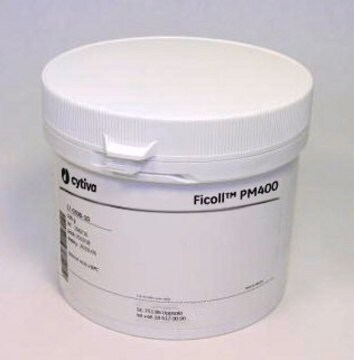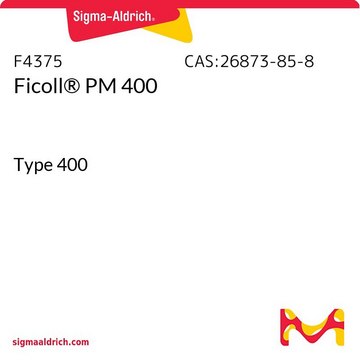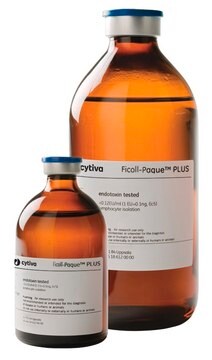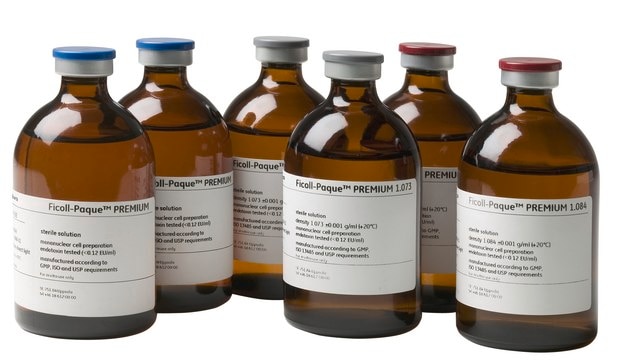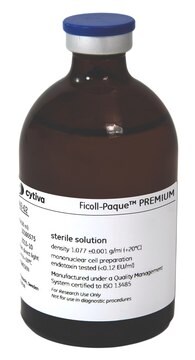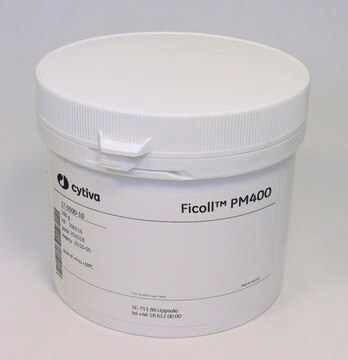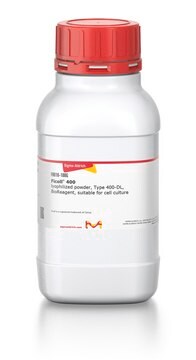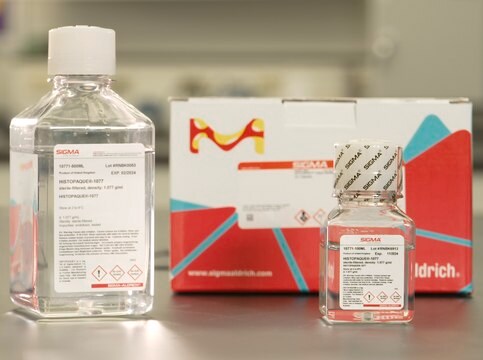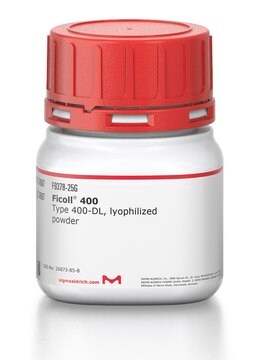GE17-0300-05
Ficoll® PM400
Cytiva 17-0300-05, pack of 5 kg
About This Item
Prodotti consigliati
Stato
solid
spray-dried
Confezionamento
pack of 5 kg
Produttore/marchio commerciale
Cytiva 17-0300-05
Colore
White
Solubilità
soluble
Descrizione generale
Ficoll® PM400 is a synthetic neutral, highly-branched hydrophilic polymer of sucrose with an average molecular weight of 400 000. It has long been used to form density gradients for separating and isolating eukaryotic cells, organelles and bacterial cells, as a stabilizing agent, and as a preparation medium for isolating mononuclear cells. Applications can also be found in defined culture media, nucleic acid hybridization, electrophoresis, and immunological studies.
Applicazioni
It also has applications in defined culture media, nucleic acid hybridization, electrophoresis, and immunological studies.
Used for gradient centrifugation in all types of centrifuge rotors and for separation at unit gravity.
Caratteristiche e vantaggi
- For producing density gradients for separation of cells and subcellular components by centrifugation or by sedimentation at unit gravity.
- Neutral, highly branched, hydrophilic polymer of sucrose which dissolves readily in aqueous solution.
- Concentrations of up to 50% (w/v) covering densities of up to 1.2 g/mL can be achieved.
- Better osmotic properties than sucrose.
- Preserves functional and morphological integrity.
- Useful for separating cells that are sensitive to centrifugation and for separating cells of similar density but different size (under conditions of sedimentation at unit gravity).
- Does not penetrate biological membranes.
- Serves as the raw material for preparation of Ficoll-Paque gradients.
- Used in other applications such as electrophoresis, hybridization, cryopreservation, and as a hapten carrier.
Stoccaggio e stabilità
Risultati analitici
Note legali
Codice della classe di stoccaggio
13 - Non Combustible Solids
Scegli una delle versioni più recenti:
Certificati d'analisi (COA)
Ci dispiace, ma al momento non ci sono COA disponibili online per questo prodotto.
Se ti serve aiuto, non esitare a contattarci Servizio Clienti
Possiedi già questo prodotto?
I documenti relativi ai prodotti acquistati recentemente sono disponibili nell’Archivio dei documenti.
I clienti hanno visto anche
Articoli
Density Marker Beads are dyed derivatives of Sephadex™. There are ten color-coded bead types, each with a specific density. They have been specifically formulated for use in Percoll gradients and will not work with other media. Using Density Marker Beads as an external marker facilitates monitoring of the gradient shape and range.
The effects of the mononuclear cell separation method described by Bøyum procedure are noted below, since research situations may arise in which they are significant.
This page shows methods to remove Percoll from a sample after centrifugation.
The table was compiled to assist the researcher in selecting references most likely to contain relevant information regarding use of Percoll in various cell types.
Protocolli
How to use percoll to prepare a gradient
The following procedure has been evaluated with Ficoll-Paque PLUS and is recommended for separation of normal blood samples for maximum reproducibility.
Il team dei nostri ricercatori vanta grande esperienza in tutte le aree della ricerca quali Life Science, scienza dei materiali, sintesi chimica, cromatografia, discipline analitiche, ecc..
Contatta l'Assistenza Tecnica.